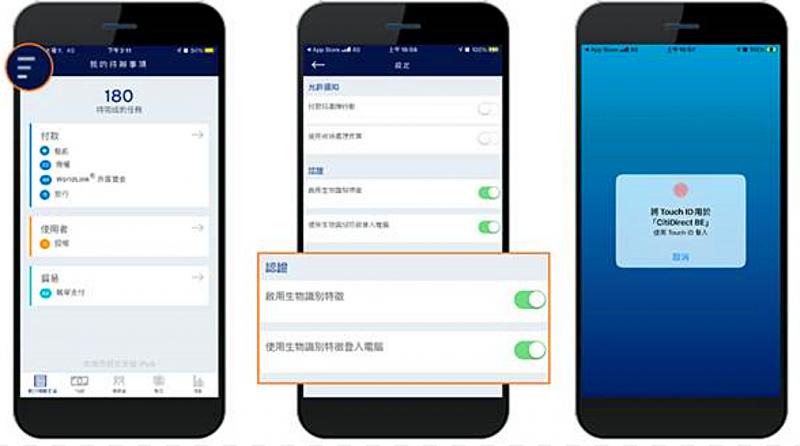Due to the COVID-19 outbreak, the proportion of customers using corporate mobile online banking has increased significantly, and the number of customers logging in to online banking using biometric methods has also increased markedly, Citibank Taiwan Ltd (花旗台灣) said.
The bank launched its mobile version of online banking — the CitiDirect BE app — for corporate customers earlier this year. It allows users to log on to online banking services using biometrics. Customers can also use this technology to log on to the desktop version of online banking for faster, simpler and more real-time financial services, the bank said.
The app provides customers with a fast, simple and secure banking experience, it said. Using the app, customers can authorize payments, check balances and cash positions, and manage users, it added.

Photo courtesy of Citibank Taiwan Ltd
To provide customers with more user-friendly and flexible access to online banking services, the app is compatible with the authentication mechanism of the existing dynamic password card, and it also allows customers to access existing CitiDirect BE online banking services through the use of biometric functions, such as fingerprint recognition or facial recognition, it added.
“Since the local COVID-19 outbreak intensified in mid-May and after the government issued a level 3 alert nationwide, many corporate customers have begun to implement work-at-home programs or divide people into different groups to work, while their transaction patterns and fund management has also changed,” said William Mor (毛偉麟), head of Treasury and Trade Solutions at Citibank Taiwan.
“We see the demand for digital financial solutions from corporate customers, and the proportion of those using CitiDirect BE mobile online banking is rapidly increasing,” he said. “Whether it is using a smartphone, tablet or a PC, the number of people logging on to CitiDirect BE using biometrics showed a significant increase in May compared with April, and we expect a more dramatic increase in June.”
“Citi’s Treasury and Trade Solutions provides the best digital financial solutions for corporate customers. Citibank redesigned the entire transaction process to provide an end-to-end digital banking experience for corporate customers to transform,” Mor said. “Through the digital solutions provided by Citibank, we have continuously and effectively assisted our customers and their business operations during the pandemic. Citibank will continue its commitment to becoming the digital platform of choice for digital business, and continue expanding the digital banking infrastructure to assist customers’ current and future needs.”
Citi’s Treasury and Trade Solutions provides innovative integrated services, tailor-made cash management and trade financing services to multinational companies, financial institutions and government departments around the world. It has the industry’s largest operating network, with banking licenses in more than 90 nations and a globally integrated technology platform.
FinanceAsia magazine last month named Citibank Taiwan this year’s “Best International Bank,” the 25th consecutive year that the bank has won the award. In addition, Global Finance magazine in September last year presented the bank with the “Best Corporate Digital Bank in Taiwan” award for the third consecutive year.

SEMICONDUCTORS: The German laser and plasma generator company will expand its local services as its specialized offerings support Taiwan’s semiconductor industries Trumpf SE + Co KG, a global leader in supplying laser technology and plasma generators used in chip production, is expanding its investments in Taiwan in an effort to deeply integrate into the global semiconductor supply chain in the pursuit of growth. The company, headquartered in Ditzingen, Germany, has invested significantly in a newly inaugurated regional technical center for plasma generators in Taoyuan, its latest expansion in Taiwan after being engaged in various industries for more than 25 years. The center, the first of its kind Trumpf built outside Germany, aims to serve customers from Taiwan, Japan, Southeast Asia and South Korea,

POWERING UP: PSUs for AI servers made up about 50% of Delta’s total server PSU revenue during the first three quarters of last year, the company said Power supply and electronic components maker Delta Electronics Inc (台達電) reported record-high revenue of NT$161.61 billion (US$5.11 billion) for last quarter and said it remains positive about this quarter. Last quarter’s figure was up 7.6 percent from the previous quarter and 41.51 percent higher than a year earlier, and largely in line with Yuanta Securities Investment Consulting Co’s (元大投顧) forecast of NT$160 billion. Delta’s annual revenue last year rose 31.76 percent year-on-year to NT$554.89 billion, also a record high for the company. Its strong performance reflected continued demand for high-performance power solutions and advanced liquid-cooling products used in artificial intelligence (AI) data centers,

Gasoline and diesel prices at domestic fuel stations are to fall NT$0.2 per liter this week, down for a second consecutive week, CPC Corp, Taiwan (台灣中油) and Formosa Petrochemical Corp (台塑石化) announced yesterday. Effective today, gasoline prices at CPC and Formosa stations are to drop to NT$26.4, NT$27.9 and NT$29.9 per liter for 92, 95 and 98-octane unleaded gasoline respectively, the companies said in separate statements. The price of premium diesel is to fall to NT$24.8 per liter at CPC stations and NT$24.6 at Formosa pumps, they said. The price adjustments came even as international crude oil prices rose last week, as traders

SIZE MATTERS: TSMC started phasing out 8-inch wafer production last year, while Samsung is more aggressively retiring 8-inch capacity, TrendForce said Chipmakers are expected to raise prices of 8-inch wafers by up to 20 percent this year on concern over supply constraints as major contract chipmakers Taiwan Semiconductor Manufacturing Co (TSMC, 台積電) and Samsung Electronics Co gradually retire less advanced wafer capacity, TrendForce Corp (集邦科技) said yesterday. It is the first significant across-the-board price hike since a global semiconductor correction in 2023, the Taipei-based market researcher said in a report. Global 8-inch wafer capacity slid 0.3 percent year-on-year last year, although 8-inch wafer prices still hovered at relatively stable levels throughout the year, TrendForce said. The downward trend is expected to continue this year,